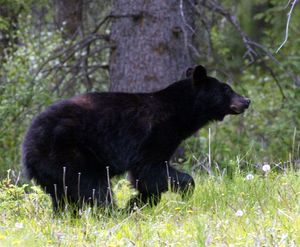Bears leaving dens early; precautions advised
WILDLIFE -- Bears are on the move early this year, lured from their winter dens by unseasonably warm weather.
Bear activity has been reported in recent weeks from the Washington Coast east to Yellowstone National Park.
"Black bears usually start making appearances in mid-to-late April, but warm weather can cause them to stir earlier," said Rich Beausoleil, bear and cougar specialist for the Washington Department of Fish and Wildlife. "Black bears are hungry when they emerge from their dens, because they lose up to half of their body weight during hibernation."
Natural foods are scarce this early in the year, so bears often start looking for the easiest source of high-protein food, he said.
People living in and at the edge of bear country can reduce the chance of attracting bear problems by securing garbage cans, removing backyard bird seed and keeping pet food indoors.
"Situations involving bears that have learned to associate food sources with people often end badly for the bear," Beausoleil said.
Two state laws prohibit leaving food or food waste in places where it can attract bears and other wild carnivores. Unintentionally or "negligently" feeding bears can bring a fine of $87 while the fine for intentional feeding can be as much as $1,000.
Human conflicts with bears tend to subside by mid-summer, when berries and other natural foods become available, and then pick up again in fall before the animals enter their dens, Beausoleil said.
Steps to prevent conflicts with bears include:
- Never intentionally feed bears or other wild animals.
- Keep garbage cans in a garage or another secure area until collection day.
- Remove pet food from areas accessible to wildlife.
- Take down bird feeders until winter.
- Thoroughly clean barbecue grills after each use.
- When camping, thoroughly clean all cooking utensils after use and seal uneaten food in airtight containers that are stored in bear-proof canisters away from sleeping areas.
Read more information on avoiding conflicts with bears.

